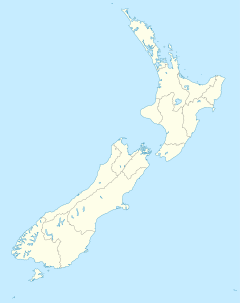Nelson Lakes National Park
| Nelson Lakes National Park | ||
|---|---|---|
| Nelson Lakes National Park | ||
|
|
||
| Location: | Tasman , New Zealand | |
| Surface: | 1020 km² | |
| Founding: | 1956 | |
| Address: | St Arnaud View Road, St Arnaud Private Bag St Arnaud Tel. 64 3 521 1806 |
|
The Nelson Lakes National Park (English Nelson Lakes National Park ) covers a 1020 km², largely untouched area in the northernmost part of the New Zealand Alps ( Southern Alps ) and is about 120 km southwest of Nelson . The national park was established in 1956 (several extensions in later years) and surrounds the two larger lakes, Lake Rotoiti and Lake Rotoroa . The center of the park is the mountain village of Saint Arnaud , on the north bank of Lake Rotoiti.
The landscape of the national park was strongly shaped by the last ice age . The earlier glaciation can still be clearly seen on the mountain ranges; it also shaped the park's lakes. The peaks of the Southern Alps in the Nelson Lakes National Park reach well over 2000 m. According to the great differences in altitude, there is a great variety of local climates and habitats. In addition to the characteristic lakes, you will find gentle valleys with beech forests as well as rugged snow-capped mountain peaks. A large variety of alpine plant species bloom in the mountain meadows above the tree line in the southern summer.
The forests in the lower elevations of the national park are habitat for a large variety of birds - among them the green hatchers , also called rifleman or titipounamu , New Zealand's smallest bird species, as well as falcons and owls . Nelson Lakes is also an ideal habitat for numerous water birds. Since the original New Zealand fauna does not contain any mammals, all the mice, deer, dogs, pigs etc. found in the park are introduced species.
As everywhere in the New Zealand Alps, the annual rainfall decreases significantly from west to east. The climate is generally temperate, with lower temperatures in the higher elevations. However, there are unstable weather conditions with abrupt weather changes.
Nelson Lakes National Park is a popular destination for vacationers and day trippers. In addition to an extensive network of hiking trails, from which the nature of the area can be experienced, it also offers visitors opportunities for mountaineering, fishing, water sports and skiing.
Web links
- Department of Conservation (English)


